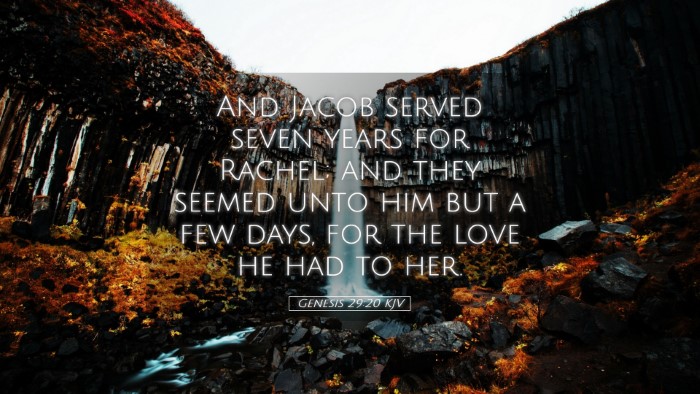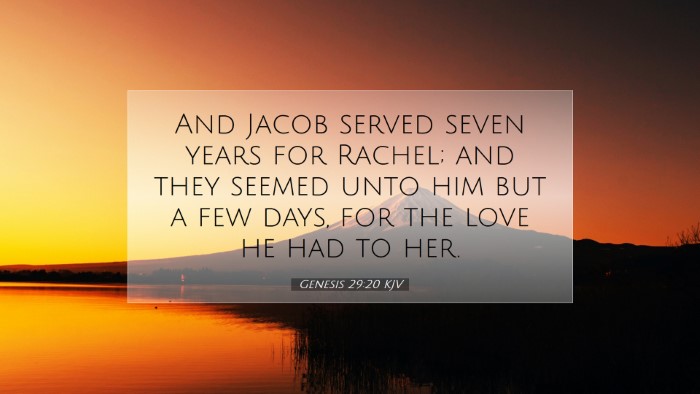Commentary on Genesis 29:20
Genesis 29:20 states: "So Jacob served seven years for Rachel; and they seemed unto him but a few days, for the love he had to her." This verse encapsulates the depth of Jacob's love and commitment, as well as the themes of labor, reward, and divine providence evident throughout the Book of Genesis.
Introduction
This commentary draws insights from various public domain sources, including Matthew Henry, Albert Barnes, and Adam Clarke, to provide a comprehensive understanding of this pivotal moment in Jacob's story. In this verse, we see not only Jacob's fervent love for Rachel but also the fulfillment of God's plan for his chosen people.
1. Jacob's Labor of Love
Jacob's willingness to serve seven years for Rachel speaks volumes about the nature of true love. Matthew Henry emphasizes this point, highlighting that Jacob's labor was not perceived as a burden but a joy. This joy arises from an earnest affection and a hopeful expectation of the future.
- Joy in Service: Henry notes that the time felt short because of the overwhelming love Jacob felt, demonstrating that true love can transform arduous tasks into joyful experiences.
- Commitment: Jacob's commitment reveals the depth of his character. It illustrates a willingness to endure hardship for the sake of a cherished relationship.
2. The Nature of Time and Sacrifice
Albert Barnes provides insights into the perception of time in the context of love and sacrifice. Jacob's seven years of service, though lengthy in the objective sense, seemed quick due to his passionate yearning for Rachel.
- Perspective of Time: Barnes notes that love can alter our perception of time, making sacrifices feel bearable and even brief.
- Sacrifice as a Dimension of Love: The concept of sacrifice as a vital expression of love is highlighted, showing that true affection naturally inclines one to labor for the beloved.
3. Divine Providence and the Narrative of Jacob
Adam Clarke elucidates the overarching themes of divine providence in Jacob's life. Jacob's labor was not only personal; it was intricately woven into God’s plan for the Israelites.
- God's Sovereign Plan: Clarke points out that while Jacob was serving Laban, God was orchestrating events that would ensure the continuation of the covenant through his lineage.
- Preparation for Leadership: The years of service were also formative, equipping Jacob with experiences that would later shape his character and leadership of Israel.
4. The Role of Love in Relationships
Love is central to the narrative, illustrating how it fuels determination and shapes choices. This relationship story can serve as a model for contemporary understanding of love in action.
- Active Love: The active nature of love, where actions speak louder than words, is evident in Jacob's determination to serve diligently.
- Longing and Anticipation: This longing exemplifies the emotional depth involved in relationships, suggesting that love often requires patience and perseverance.
5. Reflection on Modern Application
The commitment Jacob displayed can inspire modern believers, encouraging a paradigm where relational sacrifices and labors are embraced as integral parts of life and faith.
- Encouragement for Pastors and Leaders: Pastors can learn from Jacob's dedication in their own ministerial labors, embracing the challenges of service as expressions of love for their communities.
- For Students and Scholars: Students and scholars can reflect on the importance of commitment and the nature of divine calling in their pursuits, understanding that love can drive one's vocational choices.
Conclusion
Genesis 29:20 serves not merely as a historical account but also as a profound statement about love, commitment, and divine providence. The amalgamation of insights from Matthew Henry, Albert Barnes, and Adam Clarke allows us to discern deeper theological meanings and practical applications. Jacob's experience poignantly reminds us that love often leads us to extraordinary lengths, reflecting both the human experience and the divine narrative interwoven in scripture.


